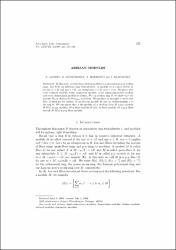| dc.contributor.author | Agayev, Nazım | |
| dc.contributor.author | Harmancı, Abdullah | |
| dc.contributor.author | Halıcıoğlu, Sait | |
| dc.contributor.author | Güngöroğlu, Gonca | |
| dc.date.accessioned | 2014-07-14T12:51:07Z | |
| dc.date.available | 2014-07-14T12:51:07Z | |
| dc.date.issued | 2009 | |
| dc.identifier.citation | AGAYEV, Nazım, Gonca GÜNGÖROĞLU, & Abdullah HARMANCI, & Sait HALICIOĞLU. "Abelian Modules." Acta Mathematica Universitatis Comenianae, 2 (2009): 235-244. | en_US |
| dc.identifier.uri | http://www.emis.de/journals/AMUC/_vol-78/_no_2/_halicioglu/halicioglu.pdf | |
| dc.identifier.uri | https://hdl.handle.net/11352/1983 | |
| dc.description.abstract | In this note, we introduce abelian modules as a generalization of abelian
rings. Let R be an arbitrary ring with identity. A module M is called abelian if,
for any m 2 M and any a 2 R, any idempotent e 2 R, mae = mea. We prove that
every reduced module, every symmetric module, every semicommutative module
and every Armendariz module is abelian. For an abelian ring R, we show that the
module MR is abelian iff M[x]R[x] is abelian. We produce an example to show that
M[x, ] need not be abelian for an abelian module M and an endomorphism of
the ring R. We also prove that if the module M is abelian, then M is p.p.-module
iff M[x] is p.p.-module, M is Baer module iff M[x] is Baer module, M is p.q.-Baer
module iff M[x] is p.q.-Baer module. | en_US |
| dc.language.iso | eng | en_US |
| dc.publisher | Faculty of Mathematics, Physics and Informatics Comenius University | en_US |
| dc.rights | info:eu-repo/semantics/openAccess | en_US |
| dc.title | Abelian Modules | en_US |
| dc.type | article | en_US |
| dc.contributor.department | FSM Vakıf Üniversitesi, Mühendislik Fakültesi, Bilgisayar Mühendisliği Bölümü | en_US |
| dc.relation.publicationcategory | [0-Belirlenecek] | en_US |
| dc.contributor.institutionauthor | [0-Belirlenecek] | |



















